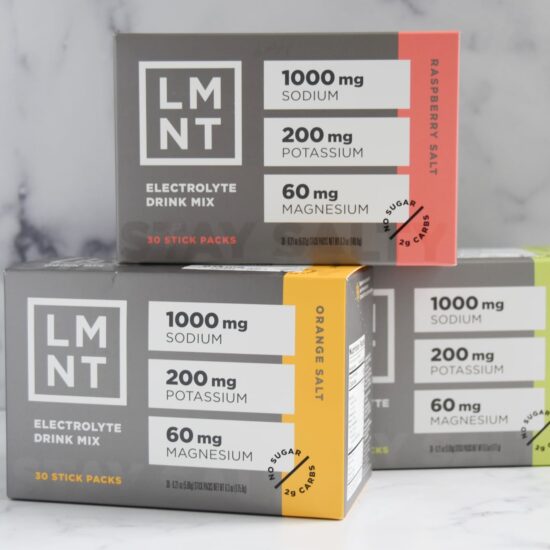This post may contain affiliate links. Please read our disclosure policy.
Everything you need to know about magnesium lysinate glycinate chelate, including benefits, absorbability, and how to know if it’s right for you.

Magnesium is the fourth most abundant mineral in your body and the catalyst for over 600 chemical reactions. It helps regulate muscle and nerve function, blood sugar, and blood pressure, and is involved in making protein, bone, and DNA.
Studies suggest almost 50% of the US population is deficient in magnesium, including adults and kids. As a result, there’s been an explosion of magnesium supplements on the market.
In the last decade, I’ve been researching, testing, and experimenting with many different forms of magnesium. While some are bioavailable, others are not. This is why choosing the right type of magnesium matters.
One form of magnesium that is growing in popularity is magnesium lysinate glycinate chelate. Many people choose to supplement with it, including myself, because it’s well tolerated, highly absorbable, and supports sleep and a calm mood. But, is it right for you? Here’s all you need to know!
Jump to:
What is Magnesium Lysinate Glycinate?
Magnesium lysinate glycinate chelate is double bonded to both lysine and glycine, which the body easily recognizes and absorbs. Because it is 100% chelated, it’s one of the most absorbable forms of magnesium with a 90% absorbability rate. This improved absorption means more magnesium is absorbed into the bloodstream without any intestinal irritation or laxative effect.
Both lysine and glycine are amino acids that are known to improve sleep, mood, and stress related symptoms. Because of this, magnesium lysinate glycinate is great for people who want to support restful sleep, a calm mood, and focus.
Benefits
In general, supplementing with magnesium may help:
- Improve sleep quality
- Reduce mental disorders, including anxiety and depression
- Lower blood pressure and decrease the risk of stroke and cardiovascular disease
- Prevent migraines
- Reduce the risk of bone fractures and osteoporosis
- Support stress management
Why Magnesium Type Matters
Magnesium is a chemically active element, which means it reacts strongly and quickly with other elements. Due to reactivity, it must be linked to another element to form a compound. The bioavailability of a specific type of magnesium depends on what it is bound to. There are many different types of magnesium because magnesium can be bound to many different types of substances.
Studies consistently show inorganic salts of magnesium are harder for the body to absorb. This is because they are bound to a substance that isn’t biological in origin. These include magnesium oxide, magnesium sulfate, and magnesium chloride.
When magnesium is bound to an organic substance, or something that is biological in origin, the magnesium is properly carried into cells. Examples of organic forms of magnesium include magnesium lysinate glycinate, magnesium malate, and magnesium taurate. The body recognizes the substance, and the magnesium is easily absorbed into the bloodstream.
The best way to make sure you are supplementing with a magnesium that is bioavailable is to take a chelated magnesium supplement like magnesium lysinate glycinate. When elemental magnesium is chelated, it is bound to a carrier by two or more points of attachment. This makes it more stable and better absorbed by the body.

While I’ve tested many different brands, I personally take Well Minerals Magnesium Lysinate Glycinate, which is designed with a special MCT formulation that eliminates unwanted additives and fillers. It’s also free of all common allergens, including gluten, wheat, soy, and dairy, and is phthalate-free.
Magnesium Deficiency
Research suggests close to half of the population is deficient in magnesium. In our modern world, people are not only consuming less, they are also burning through more magnesium.
Magnesium is predominantly found in leafy greens, nuts, avocados, and chocolate. But, soil degradation has dramatically decreased the nutrient density of food. Food gets nutrients from soil, and modern farming practices have greatly reduced mineral concentrations. Even if you’re eating plenty of spinach and pumpkin seeds, research shows only 30% to 40% of the dietary magnesium you consume is actually being absorbed in your body.
As a society, we’re also burning through more magnesium and minerals. Stress, caffeine, and pregnancy deplete magnesium stores. As you might have guessed, this means women are much more prone to magnesium deficiency.
When you’re deficient in magnesium, you can experience a wide variety of negative symptoms, including leg cramps, insomnia, fatigue, anxiety, diabetes, migraines, loss of appetite, and heart problems. Magnesium deficiency also plays a role in hormone imbalances and PMS symptoms. Low serum magnesium concentrations are even linked to higher rates of mortality.
How Much Magnesium Do You Need?
The National Institute of Health puts the RDA for adults over 31 at 420 mg for males and 310 mg for females (or 350 mg for pregnant females). An evidence-based dose for supplementation for adults is anywhere between 200 – 400 mg. Here’s the breakdown by age:

In general, you do not want to rely on a multivitamin for your magnesium. The type will likely be less bioavailable and in too small of a dose.
Side Effects
While overdosing on magnesium is rare, taking in too much magnesium in supplement form most often results in diarrhea and abdominal cramping. Magnesium draws water into the intestines, working as an osmotic laxative. This is why some forms of magnesium are often used as a stool softener. Forms of magnesium that more commonly result in diarrhea include magnesium carbonate, chloride, gluconate, and oxide.
Other symptoms of excess magnesium include:
- Low blood pressure
- Muscle weakness
- Nausea and vomiting
- Irregular heartbeat
- Facial flushing
FAQs
Magnesium lysinate glycinate is 100% chelated, highly absorbable, and doesn’t irritate the intestines. Because it’s bound to both lysine and glycine, it helps naturally support a calm mood, restful sleep, and muscle relaxation without causing drowsiness.
Lysinate glycinate means the magnesium is double bonded to both lysine and glycine, which are amino acids.
Magnesium lysinate glycinate is double bonded to both lysine and glycine, whereas magnesium glycinate is bound to only glycine. Both are chelated, highly absorbable forms of magnesium.
Magnesium can be taken at any time, on an empty stomach or with food. Take it in the morning to improve your mood or take it in the evening to support restful sleep.
Because magnesium lysinate glycinate chelate is double bonded to both lysine and glycine, it has a 90% absorbability rate. As a result, more gets into the bloodstream and there is no intestinal irritation or laxative effect.
Is It Right For You?
Because a large majority of people are deficient in magnesium, it’s important to discuss supplementation with a trusted medical practitioner. While there are many different types of magnesium on the market, magnesium lysinate glycinate is 100% chelated, highly absorbable, and doesn’t irritate the intestines. It’s an organic salt of magnesium that is double bonded to both lysine and glycine, which both help support sleep and mood.
If you want to support restful sleep, a calm mood, or reduce stress related symptoms, magnesium lysinate glycinate is the ideal form to take. I personally take Well Minerals Magnesium Lysinate Glycinate, which is designed with a special MCT formulation that eliminates unwanted additives and fillers.
More Resources
- 8 Different Types Of Magnesium & Which To Take
- Natural Remedies for Perimenopause Symptoms
- LMNT Electrolyte Review: My Honest Thoughts
- HPA Axis Dysfunction: Symptoms, Causes, and Treatment




Nancy Cucinella says
Is chelated magnesium, with lysinate and glycinate a blood thinner. Thank you for your time and information! NC
Noelle Tarr, NTP, CPT says
Hi Nancy! Magnesium lysinate glycinate is simply a form of chelated magnesium. So, any effects magnesium has will also apply with this form of magnesium. It’s assumed that magnesium has some anticoagulant properties, but the effect has been poorly quantified.